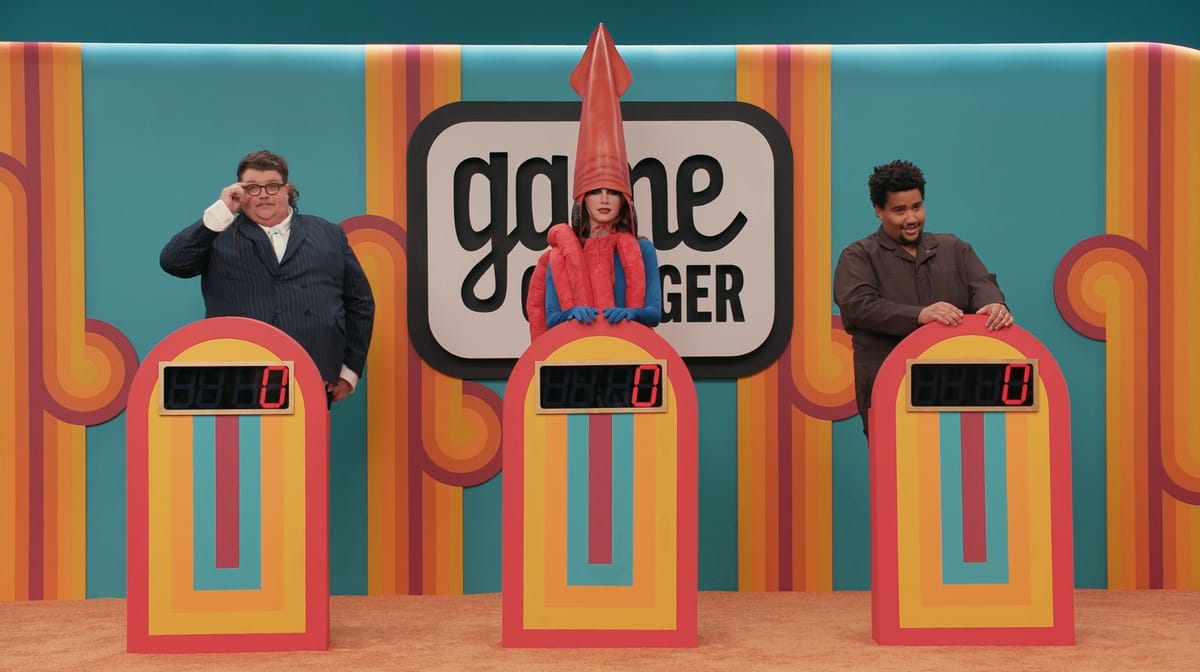Dropout and the much needed revival of sincerity
It’s funny, sure. But the true value of Dropout is building a successful business by celebrating humanities best qualities.

I recently had a conversation with a friend about the ways the internet has changed over the years. We are both millennials in our thirties, we grew up when the structures and social rules that govern the internet were very fluid and most importantly: when they allowed us to be fully formed and flawed human beings.
To be fair: It’s weird when the time you find and define yourself is also the time the world itself is in a period of turmoil and change because it’s hard to say if we just allowed ourselves to be free because we didn’t know any better or because the norms weren’t defined yet. Probably both. But it definitely meant that it was easy to find likeminded people who actually let you be part of their lives and that you could become actual real friends with.
That time is gone. For good reasons – let’s be honest the drama that went down on early Twitter was insane and privacy is a human right for a reason – but also for a lot of bad ones. There is just the sheer size of social networks, even if we are talking about ones like Bluesky and Mastodon, that are considered small. That’s great for building an audience but also makes it hard to foster intimacy.
Everything is LinkedIn now
Then there are the algorithms that surface your posts to the wider world and that lead to a total collapse of context. There is a reason why so many of my posts have follow-up replies or clarifications in brackets: You can’t assume that the audience they find knows who you are, which means you have to mention edge-cases or things you left out and the reasons behind these decisions.
Because otherwise you will get yelled at. You are obviously an idiot who doesn’t know anything and the worst possible interpretation of what you just said has to be the one you meant. And why wouldn’t it be? You are just a stranger. Benefit of the doubt is for people who have earned it.
But the largest problem of them all: The permanent record and the lack of understanding what its consequences are. Social Networks should come with a new version of the Miranda rights: Anything you say can and will be used against you – but not in a court of law with rules about what you can and can’t expect of humans and their behaviour. Instead you get judged by whatever standard the other person holds you to.
The consequence is called LinkedIn. Everything public is LinkedIn now. A place that you carefully curate to present the side of you that you believe is most compelling to whoever you want to reach or who you want to be seen as. We all do it, there is no other choice.
Lonely in a crowded room
Being a fully formed human being is for personal friends or at least acquaintances – which is why so much of our communcation has moved to private accounts, group chats and Discord. Which is all valid and fun but has the consequence of making it harder to find new connections because how do you even know if you like your mutual or just their public persona?
It’s also kind of sad, not just because it leaves some people feeling lonely but also because of its impact on the wider culture. The fewer character traits that you allow yourself, the larger your potential reach. Because then everybody knows what they are getting. It’s also boring. Because that’s not all a person is. There are so many facets to existing on this planet.
Which leads me to the hard part and the things I’m learning from Dropout. To explain what I mean I need to go from abstract concepts down to my personal experience on the internet.
Is it cowardice or just sensible?
Like I said, I spend my formative years on the internet. The first place that felt like a home was Myspace, around 2009 it became Twitter. Back then I just posted whatever came into my head. I was myself. Not a part of myself, almost all of myself. Which lead to, nobody will be surprised, making true friends. Because of course it did. That’s what happens when you allow yourself to be vulnerable around other people. But being vulnerable is kind of easy when you have nothing to lose.
I’d love to boldly claim that I’m still myself on the internet. But that would be a lie. Because even in my very comfortable position as a white cis gendered man who mainly moves in open-minded leftist spaces I feel like there could be consequences for being myself.
Sure, I’m not famous, but I do work as a freelance journalist for a public broadcaster. Being publicly funded means that there are lines that can’t be crossed. Then there is the freelance part. A larger reach makes me more attractive to media outlets. It also means that more potential clients will know that I exist in the first place. These things will always be on my mind when I post things online.
While these might be special circumstances, different variants of it will lead to similar outcomes and guide the behaviour of most people on most platforms.
The worst of both worlds
There is just this tiny little problem: While there are many valid reasons (or even forces that would endanger you if you didn’t) to hide parts of yourself away from the public I do know how it is to be mostly free of these burdens. I know how it can lead to better human connections and a different view of the world we live in. I know what we have lost.
Which is also why I chose the stupidest way possible for my online existence. I didn’t just focus on posting insightful thoughts about the topics i cover as a journalist. Because that’s boring and also I like being a whimsical bumbling idiot who tells jokes that are so dumb, that the only correct response is a groan. It’s the best. Also I don’t care if you don’t want to see dog photos. I love my dog and I want to show it to you. Yes I promised an article about Dropout and after 16 paragraphs all you get is a dog photo, I don’t care. (I do care and I’m getting to the point, I swear.)

But somewhere on the way I started what many people, especially men, do when they shape their public persona: I made myself invulnerable by becoming insincere. Not when talking about politics, but when talking about myself. I love irony and sarcasm but made the mistake of letting them infect every single thing I said about things that are meaningful to me. And in the end your main character trait is being a grump. And not even grumps like grumps.
The Point
These kind of jokes make it really hard to form personal connections. Being vulnerable is probably the most important part of making friends. Because how could you even call a person a friend who isn’t allowed to know you? Does that mean that you’re gonna tell them things that make you look like an idiot and will make you cringe when you remember them? Yes. But your friends do the same and it doesn’t make you think less of them.
Which brings me to Dropout. Very short introduction for those who don’t know: Dropout is a comedy streaming service that broadly speaking has two kinds of offerings: Dimension 20, an actual play tabletop role-playing game universe which I don’t know much about and the part that inspired this text. Think of British panel shows like QI and Taskmaster, but with a nerdy improv comedy twist.
While Game Changer might be their biggest show and has evolved into one of the best pieces of television ever created, the thing that fascinates me most is true for basically their whole catalogue: The way they center human sincerity as the focal point for their comedy and how every in their cast of very different characters seems to be on board with that idea.*
Like in the UK, Dropout’s panel shows always have a competitive element to them, but because the participants are comedians or other media professionals who are paid for their appearances, winning isn’t the main point. The difference is how the cast members interact with each other.
Embracing humanity
They are full of joy and relish in each other’s successes. While they want to win, it’s more important to help each other land the jokes in the best possible way. The games might be competitive, but the humor is always collaborative. Irony is seldom used and never turns into bitter sarcasm. It’s not about roasting people or saying outrageous things. It’s the opposite. They once challenged a contestant to endure sincere compliments from her friends. It was great.
And even on the rare occasion an experiment like »Total Forgiveness« takes a dark turn, they work out a way to highlight the humanity of the situation and look for a solution to lift each other out of the hole they accidentally dug for themselves.
But the thing that stuck with me, especially after having that talk about the internet that we used to know, is their fearless sincerity. Like a situation where somebody is surprised with an on-camera therapy session and instead of just doing the joke they need for the camera, the person actually takes this challenge head on and approaches it like an actual therapy session.
Fearlessness gets rewarded
It’s the way they improvise metaphorical trust falls on the spot that could leave them looking like a fool because they know another person will catch them (or that the footage when they don’t won’t be aired for cheap laughs.) And then there is the most impressive thing I have seen comedians do: They decided to ditch a particularly insane and time consuming challenge and instead write poems about how much they appreciate each other. Not joke poems. Actual poems. Without irony or funny voices. No characters to hide behind. Not even music. Standing next to the people the poems are about. In front of running cameras.
This amount of fearlessness alone will inspire many people. But the thing that made me write way too much is seeing how successful Dropout’s way of doing comedy has become. They are rapidly growing and despite being indie they are able to pay their talent well. Because there is an audience that craves sincerity. Especially in times like ours.
And while you or I, people who aren’t in the performing arts, might not be actively rewarded for shedding cynicism in favor of vulnerability, we should take Dropout’s success as a sign, that people will appreciate it. Worst case scenario is that you make it easier for yourself to find new friends.
Fuck being on LinkedIn, be yourself. Or at least as much yourself as you can afford to be. Which is more than you think. See, even grumpy old me can write something full of optimism. Yes it feels awkward. I’m gonna hit publish anyway.
*A reminder for people who want to get into this Dropout thing: While everybody seems to be happy and the company does a lot of commendable things, there is always the chance of a Bon Appétit scenario. Be aware of parasocial relationships. But enjoy them while the fun lasts.


